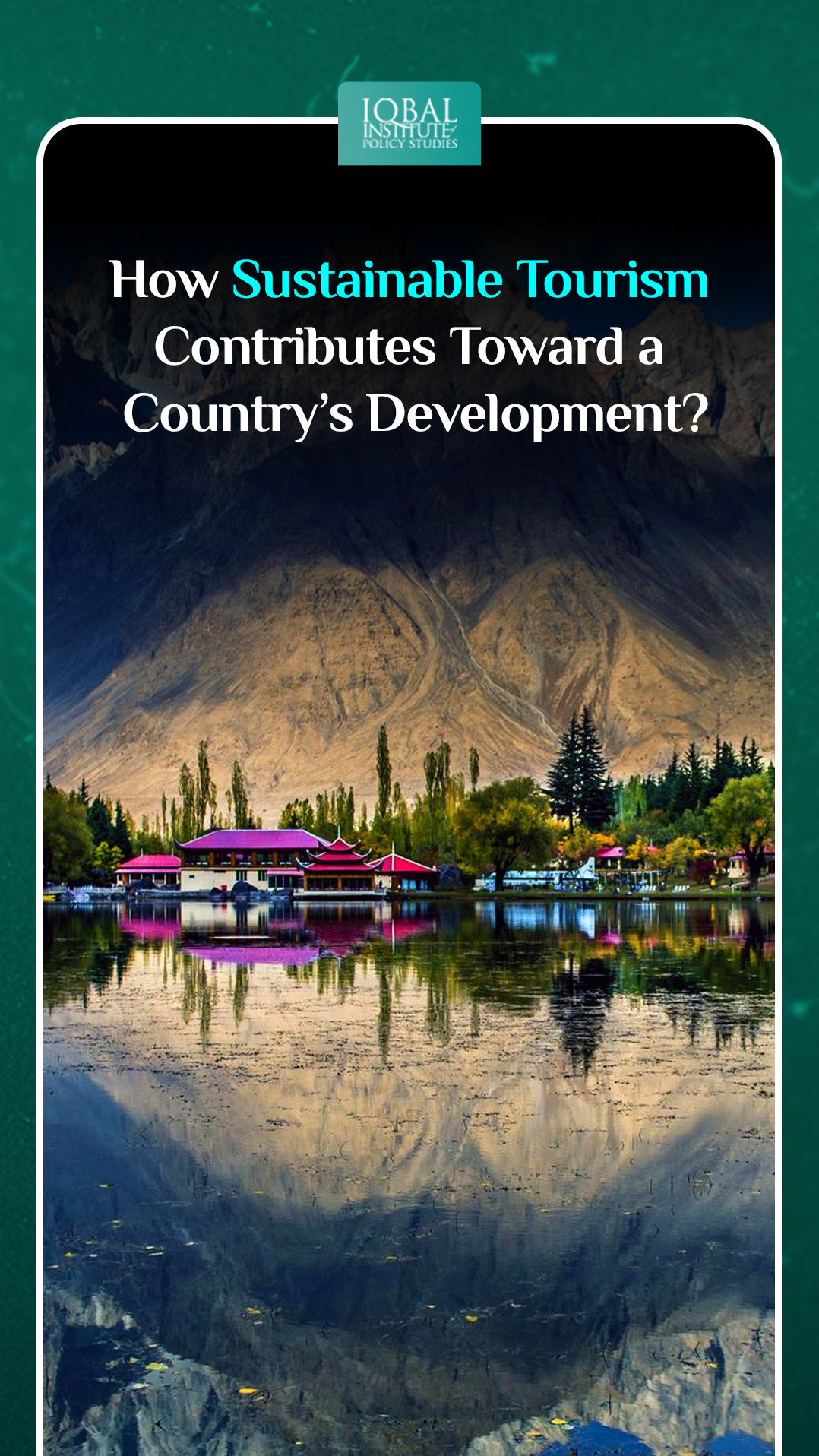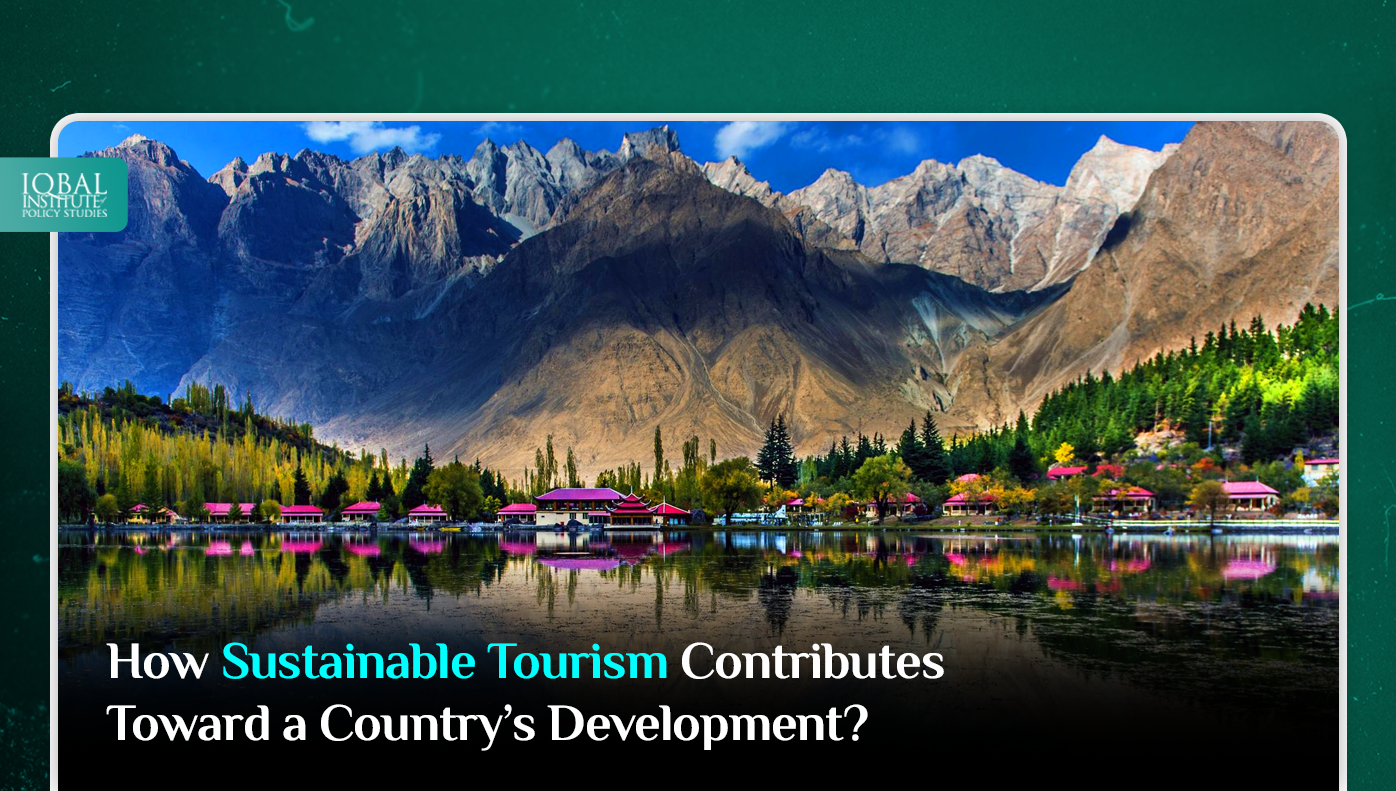Tourism is essential for the success of many economies around the world. However, the ominous threats of climate change have grasped the attention of policymakers and stakeholders worldwide. As a result, the concept of sustainable tourism is becoming quite popular among countries. Sustainable tourism considers current and future economic, social, and environmental impacts and the needs of tourists, the industry, the environment, and host communities. It counts for development, benefitting communities in destinations around the world. Moreover, it drives income, employment, and regional growth. As demand for global tourism continues to grow, the opportunities for development via sustainable tourism also increase as it can improve livelihoods, increase inclusion, protect cultural heritage and natural resources, and promote international understanding. Nonetheless, adapting to sustainable tourism is slow in developing nations where tourism is poorly planned. Thus, it negatively impacts cities, parks, and historical monuments and strains local infrastructure, residential communities, and resources. Therefore, tourism policies must focus on its sustainability while emphasising on its marketing and tourism promotion. It will ensure social prosperity and economic growth eventually.
Why Should Pakistan Adopt Sustainable Tourism?
Tourism offers lucrative opportunities for emerging economies and developing countries like Pakistan. According to World Travel and Tourism Council, in 2017, 1.75 million tourists visited Pakistan, generating $19.4 billion in revenue and accounting for 6.9% of GDP. By 2030, the figure is expected to rise to $36.1 billion (Manzoor, Wei, Asif, Muhammad, & Rehman, 2019). Also, over two million foreign tourists visited Pakistan, primarily in the Northern Areas. (Khan, Ali, Zada, Saeed, & Zada, 2022). According to the World Economic Forum’s report, Pakistan has soared six places in the International Travel and Tourism Development Index by ranking 83/117 countries (World Economic Forum, 2022). On the contrary, the country is greatly vulnerable to radical shifts in climate. In 2022, climate catastrophes caused the destruction of unimaginable proportions. For instance, climate change-related disasters have killed over 1700 people, displaced over 8 million people, and cost more than $30 billion in economic losses (The World Bank, 2022). Moreover, the country has decades-old tourism policies which do not address the maintenance of tourist destinations, conservation of the environment, and protection of natural resources. Ineffective law enforcement strategies and guidelines result in polluted tourist destinations. Furthermore, Pakistan is in the grip of a severe balance-of-payments crisis, and the government is aggressively promoting tourism to generate revenue for the national budget. This compromises long-term sustainability for short-term financial gains. Therefore, the government needs to incorporate sustainability in its tourism policy, followed by its effective implementation across the country. Creating awareness regarding the significance of sustainable tourism at the local and national levels will drive behavioural change and create environmental awareness. By adopting sustainable tourism, Pakistan can untap its tourism potential and benefit greatly from the developments it provides.
Role of Sustainable Tourism in Development
Economic Benefits
Sustainable tourism enhances GDP growth in host countries and contributes greatly to the government’s tax revenue. For example, Sweden improved its economy, environment and society by embracing sustainable tourism (ANDREWS, 2021). It also leads to increased international trade, investments and the export of new products. For instance, Moldova produces 4000 tons of honey annually, primed for green export growth (UNCTAD, 2019). Furthermore, sustainable tourism also enhances the basic infrastructure. For example, The World Bank Cultural Heritage Preservation and Tourism Sector Support Project in Haiti resulted in infrastructure development for locals, such as upgraded water and sanitation, while making the country more attractive to tourists and investors by improving the environment (The World Bank, May). The low-income economies greatly benefit from tourism as well. In 2015, the world’s 48 lower-income and lower-middle-income countries earned USD21 billion from international tourism (World Bank Group, 2017). According to the World Travel and Tourism Council, the tourism industry has increased Pakistan’s GDP by 2.9% and added about $8.8 billion to the country’s economy (The Nation, 2022).
Drives Employment and Growth
Due to drastic climate change, sustainability is becoming mainstream in every sector, including tourism. Countries that would encourage sustainable tourism will attract more tourists. This will create job opportunities for communities residing in the destinations. For example, Africa generated $300 billion and created 49 million jobs through coastal tourism (World Bank, 2022). More job opportunities across various country regions can reduce rural-to-urban migration, as tourism can also thrive in rural areas. Moreover, sustainable tourism has the potential to reach and benefit a large number of people by promoting inclusive growth and allowing a wide range of the country’s labour force to participate. For instance, In Namibia, communal conservancies protect the nation’s wildlife and allow for innovative tourism partnerships that create jobs and attract visitors who travel to see the flourishing wildlife populations (World Bank Group, 2017).
Leads to Environmental Conservation and Protection
Demand for nature-based travel is high, which raises the value placed on pristine environments and wildlife. It also generates funds used for conservation. For example, in 2014, 66% of all international visitors to Australia travelled for nature-related reasons and spent a total of USD18.32 billion there (World Bank Group, 2017). This form of tourism will also raise awareness about the radical shifts in climate leading to the adaption of sustainable practices within the communities. For instance, Bhutan’s controlled tourism is based on the principle of “high value, low impact”. It protects the environment, creates awareness among travellers, and also benefits its communities through developed infrastructure, free health care, and education (Sustainable Management School, 2022).
Cultural Heritage Management, Funding, and Protection
Unplanned and poor tourism policies may result in overcrowding, loss of authenticity, cultural appropriation, and damage to heritage sites. However, sustainable tourism can drive and enable sustainable development. It offers a new perspective on culture, as it places cultural heritage and local communities at the centre of decision-making processes. Intangible cultural heritage, music, performing arts, and oral traditions can also be revived or protected by it. For example, The Tanzania Tourist Board has supported local communities in over 50 destinations to organise cultural excursions, which not only shared Tanzania’s cultural diversity with its 70,000 annual tourists, it preserved that culture and generated income for 3,000 local people (World Bank Group, 2017). These practices sustain cultural tourism and create unique experiences for tourists.
Fosters International Collaboration and Understanding
Meeting diverse people from various socio-economic backgrounds and experiencing new cultures foster peace, intercultural understanding, security and global citizenship. According to research from the WTTC and the Institute of Economics and Peace, countries with a more open and sustainable tourism sector tend to be more peaceful (World Travel and Tourism Council, 2016). Moreover, tourism also leads to regional cooperation to create shared tourism products and to welcome more tourists. For example, the Africa Union (AU) and the African Development Bank are implementing an open visa policy for members of the AU to encourage the free movement of people and boost tourism and trade (World Bank Group, 2017). Sustainable tourism also aids in post-conflict recovery. For instance, Rwanda rebranded itself as a nature-based tourism destination and is now recognised for its mountain gorillas rather than conflict (World Bank Group, 2017).
Conclusion
Tourism drives economic growth and social productivity. However, the concept of traditional tourism is transforming into sustainable tourism amid pervasive climate change. This form of tourism ensures the sustainable development and growth of the economy, society, culture, and environment. Therefore, countries worldwide must embrace sustainability and embody the concept of sustainable tourism in their national policies. This will result in booming economies and a greener environment. Steps like these can strengthen international collaboration and aid in lessening the pace of acute climate change in the long run.



Leave a Reply